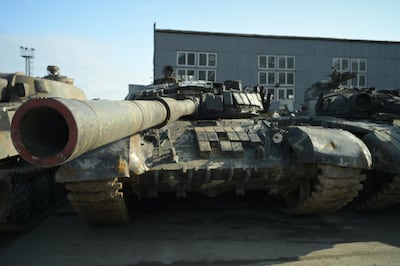In drone footage released by Azerbaijan’s Ministry of Defence, the camera captures an Armenian crew scrambling from the turret of a tank and running for nearby trees.
There is no explosion but the tank is left behind.
Drones haunted Armenian soldiers, leading to many such scenes. Fearful of a missile strike, soldiers abandoned lorries and tanks.
Azerbaijan’s use of Turkish-made drones is widely seen as a key factor in Baku’s success in the Nagorno-Karabakh region, where a Russia-brokered ceasefire largely brought fighting to an end.
Afterwards, Azerbaijan was left with Armenian military hardware, much of it in working condition and requiring a coat of paint before it is re-used.
From Soviet-era armour to anti-aircraft systems, the spoils of war were taken to a military base near Baku.
The National was given exclusive access to the base where vehicles, some bearing Armenian number plates and unit markings, are repaired and put to use by the Azerbaijani military.
Under the glare of the winter sun, mechanics worked on vehicles including T72 tanks to armoured personnel carriers.
Orthodox Christian crosses painted by Armenian crews are removed and armour is added.
In a corner of the yard lie helmets and ripped clothing left behind by the vehicles' occupants.
Although Azerbaijan would not give exact figures, one soldier told The National that hundreds of Armenian tanks had passed through his processing area.
Armenia said little about its losses, but a former commander of its forces in Nagorno-Karabakh said they were substantial.
"On the morning of September 27, the Armenian side lost 50 per cent of its anti-aircraft resources and 40 per cent of its artillery," he was quoted by Hyetert website as saying.
"We did not have an anti-aircraft force. We had six Tor [surface-to-air] missile systems, four of which were destroyed."
MATCH INFO
Uefa Champions League semi-final, first leg
Bayern Munich v Real Madrid
When: April 25, 10.45pm kick-off (UAE)
Where: Allianz Arena, Munich
Live: BeIN Sports HD
Second leg: May 1, Santiago Bernabeu, Madrid
ULTRA PROCESSED FOODS
- Carbonated drinks, sweet or savoury packaged snacks, confectionery, mass-produced packaged breads and buns
- margarines and spreads; cookies, biscuits, pastries, cakes, and cake mixes, breakfast cereals, cereal and energy bars;
- energy drinks, milk drinks, fruit yoghurts and fruit drinks, cocoa drinks, meat and chicken extracts and instant sauces
- infant formulas and follow-on milks, health and slimming products such as powdered or fortified meal and dish substitutes,
- many ready-to-heat products including pre-prepared pies and pasta and pizza dishes, poultry and fish nuggets and sticks, sausages, burgers, hot dogs, and other reconstituted meat products, powdered and packaged instant soups, noodles and desserts.
SHAITTAN
%3Cp%3E%3Cstrong%3EDirector%3A%20%3C%2Fstrong%3EVikas%20Bahl%3Cbr%3E%3Cstrong%3EStarring%3A%20%3C%2Fstrong%3EAjay%20Devgn%2C%20R.%20Madhavan%2C%20Jyothika%2C%20Janaki%20Bodiwala%3Cbr%3E%3Cstrong%3ERating%3A%20%3C%2Fstrong%3E3%2F5%3C%2Fp%3E%0A
Martin Sabbagh profile
Job: CEO JCDecaux Middle East
In the role: Since January 2015
Lives: In the UAE
Background: M&A, investment banking
Studied: Corporate finance
Quick pearls of wisdom
Focus on gratitude: And do so deeply, he says. “Think of one to three things a day that you’re grateful for. It needs to be specific, too, don’t just say ‘air.’ Really think about it. If you’re grateful for, say, what your parents have done for you, that will motivate you to do more for the world.”
Know how to fight: Shetty married his wife, Radhi, three years ago (he met her in a meditation class before he went off and became a monk). He says they’ve had to learn to respect each other’s “fighting styles” – he’s a talk it-out-immediately person, while she needs space to think. “When you’re having an argument, remember, it’s not you against each other. It’s both of you against the problem. When you win, they lose. If you’re on a team you have to win together.”
Nepotism is the name of the game
Salman Khan’s father, Salim Khan, is one of Bollywood’s most legendary screenwriters. Through his partnership with co-writer Javed Akhtar, Salim is credited with having paved the path for the Indian film industry’s blockbuster format in the 1970s. Something his son now rules the roost of. More importantly, the Salim-Javed duo also created the persona of the “angry young man” for Bollywood megastar Amitabh Bachchan in the 1970s, reflecting the angst of the average Indian. In choosing to be the ordinary man’s “hero” as opposed to a thespian in new Bollywood, Salman Khan remains tightly linked to his father’s oeuvre. Thanks dad.


